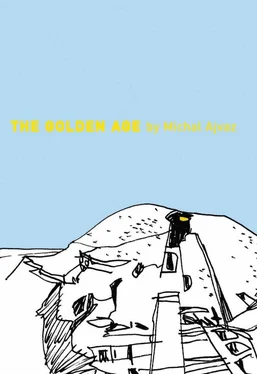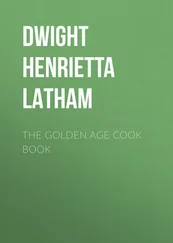Michal Ajvaz - The Golden Age
Здесь есть возможность читать онлайн «Michal Ajvaz - The Golden Age» весь текст электронной книги совершенно бесплатно (целиком полную версию без сокращений). В некоторых случаях можно слушать аудио, скачать через торрент в формате fb2 и присутствует краткое содержание. Год выпуска: 2010, Издательство: Dalkey Archive Press, Жанр: Современная проза, на английском языке. Описание произведения, (предисловие) а так же отзывы посетителей доступны на портале библиотеки ЛибКат.
- Название:The Golden Age
- Автор:
- Издательство:Dalkey Archive Press
- Жанр:
- Год:2010
- ISBN:нет данных
- Рейтинг книги:4 / 5. Голосов: 1
-
Избранное:Добавить в избранное
- Отзывы:
-
Ваша оценка:
- 80
- 1
- 2
- 3
- 4
- 5
The Golden Age: краткое содержание, описание и аннотация
Предлагаем к чтению аннотацию, описание, краткое содержание или предисловие (зависит от того, что написал сам автор книги «The Golden Age»). Если вы не нашли необходимую информацию о книге — напишите в комментариях, мы постараемся отыскать её.
is Michal Ajvaz’s greatest and most ambitious work.
The Golden Age
The Golden Age — читать онлайн бесплатно полную книгу (весь текст) целиком
Ниже представлен текст книги, разбитый по страницам. Система сохранения места последней прочитанной страницы, позволяет с удобством читать онлайн бесплатно книгу «The Golden Age», без необходимости каждый раз заново искать на чём Вы остановились. Поставьте закладку, и сможете в любой момент перейти на страницу, на которой закончили чтение.
Интервал:
Закладка:
All this gave the Europeans bad migraines, which drove them into the gloom of their rooms and interior courtyards. They were alarmed to realize that they were beginning to look at the world through the eyes of the islanders. They were made nauseous by the world revealing itself to them, a world in which all sounds made a dreamlike music and all movements a monotonous, incomprehensible, melancholy ballet. On the island a great many things occurred which frightened them, but perhaps most frightening of all was the fact that in the depths of their consciousness they understood this singular world and actually liked it. They had grasped the extreme certainties of mathematics and faith but in so doing they had accelerated the catastrophe: to this presumed stronghold they had attracted demons who fell on the new prey with gusto and devoured its world. With the fall of mathematics and faith, the rest of the world, too, would go soundlessly into decline.
The Europeans continued to hold to mathematics, even after they began to perceive mathematical equations and calculations as bizarre dramas, as evidence of the work of the same blind forces as those that cultivated logical deduction and flowed through machines, forces which drove an unceasing, monotonous division and unification. The Europeans were made nauseous by multiplication because now they perceived it as a diseased swelling, a proliferation anterior to any kind of sense and order, a growth which had arisen by the dull repetition of the same numbers and their resigned coalescence in the whole; they dreaded division because in it they saw disintegration, made more horrifying still by the unnatural disintegration of wholes into parts of equal size. Addition was yet worse, as it meant a progressive decline in new units, heralding the destruction of all divided shapes and the enthronement of One that is nothing, the victory of the monster of the Whole. Subtraction was the saddest of all: they saw in it the falling off of sick pieces, a kind of arithmetical leprosy, a crumbling that turned shapes into dust, that led down another path to nothingness. They performed calculations because they sought salvation in exactitude, but at the same time they were horrified to perceive mathematical operations as movements of some monstrous figure; instead of considering the result of a calculation, the Europeans saw the choreography of a loathsome dance, a dance similar to that performed by the treacherous machines.
Having been betrayed by mathematics they turned to the saints of their prayer books, but now they had the impression that the sounds of the prayers were made up of some dark material which was not of their God’s creation and which had so little in common with Him it could not even be said to stand in opposition to Him; indeed, He was indifferent to it. It was just that in His words resided the murmur of the ancient melody, a melody that sounded in the emptiness before the Word, that hummed quietly in the first word and in which the meanings of words are still dissolved today. And pictures of the faces of saints were lost in the labyrinthine pleats of the drapes, became nothing more than pleats in some fabric undulating in the cosmic wind, gathering then opening out as if in a dream, submerged in a spider’s web of fine cracks that absorbed and devoured them, then spewed out the face of an unknown god or devil.
The islanders liked the barely perceptible shapes made by the waves of the sea and the leaves as they moved in the wind, but the geometry of the town the foreigners had built presented them with no problems; the straight lines and right angles seemed to them like the parting of the same forces that draw and then erase white figures of foam on the sea and wake in the treetops a silvery surf. These forces created all shapes and all shapes exhaled them; the forces were the same, whether they played with elusive traces of smoke or drew a straight line and then broke it into a right angle. Through the eyes of the islanders the straight lines of the lower town were transformed into a dreamlike web, whose lines sounded like thin strings in a music of empty, apathetic or liberated time that was heading nowhere. And so a town that was soaked in dreams when it first came into being, now lost its last remnants of substantiality: it transformed from a dream to a dream. For the foreigners it became a tormentuous labyrinth of hot walls from which there was no escape, while the natives were able to settle in, take walks about the squares, and relax in the shade of the great colonnades and on the magnificent granite embankments with their statues of sphinxes and lions.
The native women submitted to the foreigners, but the foreigners acquired the habits and the gestures of the natives and their children spoke the natives’ language better than their own. It seems that by the third generation, the conquerors had merged with the natives: they had forgotten their language, abandoned their books, machines and their god, and were listening to the murmur of the sea and the scratching of the sand, or watching shadows move across walls on hot afternoons. All that remained of the foreigners were certain features in the faces of the islanders — like the letters of a forgotten alphabet, the sense of which has been lost. Of the foreigner’s language, a few roots remained, which the language of the natives absorbed and used in its games; they were good for prefixes and suffixes. The shapes of the instruments the conquerors brought to the island can still be seen today in the adornment of facades — in simplified, distorted and endlessly repeated form. And thus the conquerors disappeared. What remained of them was the lower town — their dream of home that had become a stifling labyrinth, overgrown with reeds and smothered in sand.
I believe that this breakdown in the thinking of the foreigners after years of torment, homesickness and anxiety brought with it a deep, unexpected joy, and that in its final phase the foreigners accelerated the process themselves. To their astonishment and delight, they began to understand that the labyrinth they had built for themselves and that had them in its grasp, was after all the home they had yearned for while at sea, that it was more of a home to them than the distant cities of Europe whose systems had been dissolved for them beyond all reconstruction in the winds of the tropics. Out of the town the foreigners had built as a memorial, the natives had fashioned a new town — a labyrinth-town — in which, so it proved, it was possible to live in contented tranquillity; it was at once Ithaca and the island of the Lotus Eaters. But in the birth of the new town the foreigners also played their part — by how they saw it, by how they responded to it in gesture, by the paths they pursued in it. Now they saw the same town as the natives did. For the foreigners, too, all shapes had the same importance; their feet, too, made of the town’s geometric ground plan an intricate mandala of futility. They came to understand that the force echoed in the motions of machines and the procedures of logic and mathematics could be accepted and delighted in, that the cosmic ballet they had had such an abhorrence of, could be seen as a performance of endless fascination. I imagine them sitting on the patios of their palaces, just watching, filled with a joy growing like the weeds and shrubs produced by scattered seeds, like the sand that blew gently into their living spaces. I think they forgot all about Europe, but the cities of the north were transformed in the joyful dream of the moment, which floated among the hot walls and was just as much a part of this place as the roar of the sea. A golden age began with stains, rustlings and aimless journeys.
I understood them because I, too, got a taste on the island of the lotus of effervescent chaos. Perhaps this was not even chaos, but something beyond chaos, a space of calm, swirling forces from which shapes, images and some sense of order rose up before sinking back without regret or memory. I would say to Karael almost daily how much I was irritated by the indifference and laziness of the islanders, but still I let one ship after another sail away without me, until the time arrived when I realized that my own transformation had progressed so far that in a few weeks or days I would be unable to leave the island, ever. So return home I did, but I will be forever marked by my stay on the island. I feel the island present within me still like an incurable disease a traveller brings back from the tropics in his blood, like a stifled fever that silently marks every gesture and glance. And I know that forever more every shape I see will be lost in the repulsive yet delightful network of mazy, tangled lines; forever more words will be somewhat higher waves on the endless, unbroken surface of the rustlings.
Читать дальшеИнтервал:
Закладка:
Похожие книги на «The Golden Age»
Представляем Вашему вниманию похожие книги на «The Golden Age» списком для выбора. Мы отобрали схожую по названию и смыслу литературу в надежде предоставить читателям больше вариантов отыскать новые, интересные, ещё непрочитанные произведения.
Обсуждение, отзывы о книге «The Golden Age» и просто собственные мнения читателей. Оставьте ваши комментарии, напишите, что Вы думаете о произведении, его смысле или главных героях. Укажите что конкретно понравилось, а что нет, и почему Вы так считаете.












